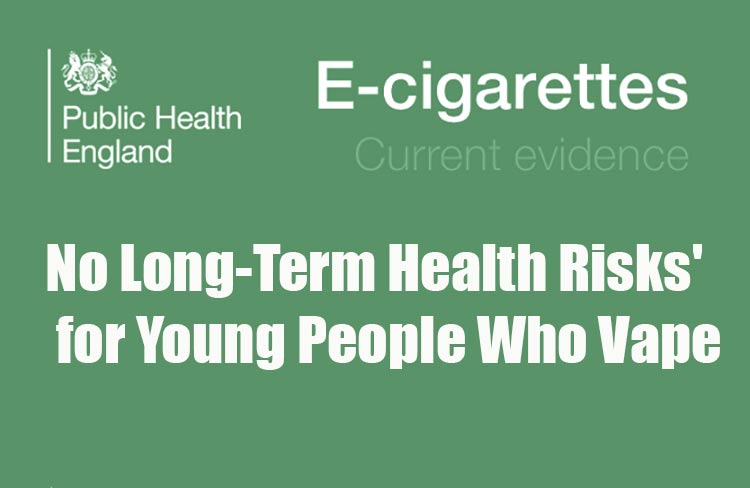Table of Contents [show]

Introduction to the Topic of Youth Vaping
No Long Term Health Risks for Youth Vaping Says Public Health England? Indeed. Youth vaping – a hot topic that’s been sparking debates and igniting concerns among parents, health experts, and policymakers alike. But amidst the cloud of confusion and fear surrounding this controversial habit, there is a ray of hope shining through.
Enter Public Health England (PHE), an authoritative voice in the field, armed with research that challenges the prevailing narrative. In their latest report, PHE boldly claims that youth vaping poses no long-term health risks. Buckle up as we dive into this groundbreaking study and explore why it might just be time to shift our perspective on the world of vape!
Background information on Public Health England (PHE)
Public Health England (PHE) is an executive agency of the UK Department of Health and Social Care, dedicated to protecting and improving the nation’s health. With a focus on evidence-based research and policy development, PHE plays a crucial role in shaping public health initiatives.
As a trusted authority, PHE has been closely monitoring the use of e-cigarettes among young people. Their comprehensive report on youth vaping offers valuable insights into the long-term health risks associated with this increasingly popular trend.
PHE’s findings indicate that there are no significant long-term health risks for youth who vape. While it acknowledges that e-cigarette use among young people should be discouraged due to potential nicotine addiction, it emphasizes that vaping is far less harmful than smoking tobacco cigarettes.
This stance aligns with organizations like Spinfuel, which supports vaping as a safer alternative to traditional smoking. By promoting harm reduction strategies, they recognize the potential benefits of embracing e-cigarettes as a way to reduce overall tobacco-related harm in society.
However, it’s important to note that not all health organizations share this view. Some argue that there isn’t enough evidence yet to fully understand the long-term effects of vaping on young people’s health. This difference in opinion highlights the ongoing debate surrounding youth vaping and calls for further research in this area.
Addressing concerns about nicotine addiction is another key aspect highlighted by PHE’s report. It stresses the importance of prevention efforts targeting young people and encourages stricter regulations around advertising and access to e-cigarettes for underage individuals.
While youth vaping remains a concern from both public health and regulatory perspectives, it is essential not to overlook one potential benefit: adults using vaping devices as aids in quitting smoking altogether. For those struggling with traditional cigarette addiction, switching to e-cigarettes can provide an effective means of reducing harm without completely abandoning their nicotine dependency.
Public Health England plays a vital role in providing evidence-based information on youth vaping and its potential impact on health. Through their research and reports, they contribute to the ongoing dialogue surrounding e
PHE’s report on the Long Term Health Risks of Youth Vaping
Public Health England (PHE) has recently released a report on the long-term health risks of youth vaping, shedding light on this controversial topic. The findings challenge many preconceived notions and provide valuable insights into the effects of vaping on young individuals.
According to PHE’s report, there is currently no evidence to suggest that youth vaping poses significant long-term health risks. This finding may come as a surprise to some, given the ongoing debate surrounding e-cigarettes and their potential harm. However, it is important to remember that PHE is a reputable organization dedicated to public health research and promotion.
The report also emphasizes that while not risk-free, vaping remains significantly less harmful than smoking traditional cigarettes. This assertion aligns with the growing body of evidence supporting the use of e-cigarettes as an alternative for adult smokers looking to quit or reduce their tobacco intake.
Critics argue that promoting e-cigarette use among young people could lead to nicotine addiction and serve as a gateway towards smoking conventional cigarettes. While these concerns are valid, it is crucial not to conflate them with conclusive evidence regarding long-term health risks specifically associated with youth vaping.
It’s worth noting that PHE’s stance does differ from other health organizations such as the World Health Organization (WHO), which takes a more cautious approach towards endorsing e-cigarettes. These contrasting viewpoints highlight the complexity of this issue and emphasize the need for further research in order to form comprehensive conclusions about its potential impact on young individuals.
As we navigate through these debates surrounding youth vaping, it is essential not only for policymakers but also parents and educators alike to foster open discussions based on scientific evidence rather than fearmongering tactics or unfounded claims.
By focusing on accurate information rather than sensationalism, we can better understand how best to address any existing concerns while still recognizing potential benefits offered by responsible vape usage among adults seeking alternatives to smoking.
Public Health England’s recent report provides valuable insights into the long-term health risks of youth vaping. While not without its limitations, the report challenges
Spinfuel Supports Vaping Over Smoking Anytime, Anywhere, Especially Youth Vaping over Cigarettes
Spinfuel, the renowned online vaping magazine, has made its stance clear – it wholeheartedly supports vaping over smoking, anytime and anywhere. With a mission to provide accurate information and educate readers about the world of vaping, Spinfuel believes that embracing this alternative is a step in the right direction for public health.
One of the key reasons behind their support lies in the countless studies that have shown vaping to be significantly less harmful than smoking traditional cigarettes. By eliminating tobacco combustion and reducing exposure to toxic chemicals found in cigarette smoke, switching to vaping can potentially reduce long-term health risks associated with smoking.
Moreover, Spinfuel emphasizes that vaping allows users more control over nicotine consumption. Unlike traditional cigarettes where nicotine levels are fixed, e-cigarettes offer various options for nicotine strength or even allow users to vape without any nicotine at all. This flexibility provides a pathway for smokers who wish to gradually reduce their addiction or quit altogether.
Another advantage highlighted by Spinfuel is the convenience factor. Vaping offers an array of flavors and styles that cater to individual preferences. Plus, unlike smoking which often requires designated areas or rooms due to secondhand smoke concerns, vapers can enjoy their device discreetly without negatively impacting those around them.
In essence, Spinfuel’s unwavering support stems from its belief in harm reduction strategies as well as personal freedom of choice when it comes to one’s own health decisions. Through promoting responsible use and informed decision-making regarding e-cigarettes instead of demonizing them outright, they hope more people will consider making the switch from smoking to vaping.
By supporting this alternative option while acknowledging ongoing research on potential risks associated with youth usage specifically, Spinfuel encourages individuals – both young and old – seeking healthier alternatives to explore the world of vaping under regulated conditions until further evidence emerges on any possible long-term effects.
Less Hysteria More Science – Youth Vaping is Not the Satan’s Work After all
“There’s no denying that vaping has become a highly controversial topic in recent years. With concerns about its impact on our health, particularly for young people, it’s easy to see why there is so much hysteria surrounding this alternative to smoking. However, it’s time to take a step back and look at the facts.
Public Health England (PHE), a renowned authority on public health matters, recently released a report stating that there are no long-term health risks associated with youth vaping. This statement alone should help alleviate some of the fears and misconceptions surrounding this topic.
It’s important to remember that PHE is not an organization known for making unfounded claims or jumping to conclusions without substantial evidence. Their research and findings are based on rigorous scientific studies conducted by experts in the field.
While it is crucial to acknowledge any potential risks associated with vaping, we must also consider the context. Comparatively speaking, smoking traditional cigarettes poses far greater dangers than using e-cigarettes or vape devices. It would be unfair to label vaping as “Satan’s work” when it can potentially provide smokers with a less harmful alternative.
By focusing more on scientific evidence rather than succumbing to fear-mongering tactics, we can have productive discussions about how best to regulate and educate young people regarding vaping products. It’s essential not only for their safety but also for providing them with accurate information about potential harms versus benefits.
Let’s prioritize science over hysteria when addressing the topic of youth vaping. Public Health England’s report provides valuable insights into the lack of long-term health risks associated with this practice.
While concerns remain valid and further research is necessary, demonizing vaping without considering its potential benefits may hinder progress towards finding effective harm reduction strategies for smokers seeking alternatives.”
Contrasting Opinions from Other Health Organizations on Youth Vaping
When it comes to the topic of youth vaping, there are varying opinions among different health organizations. While Public Health England (PHE) has recently released a report stating that there are no long-term health risks associated with youth vaping, some other organizations may hold a different viewpoint.
For instance, the American Lung Association has expressed concerns about the potential dangers of e-cigarettes and their impact on young people. (ALA is a huge political influence peddler however) They argue that more research is needed to fully understand the effects of vaping on lung health and overall well-being. (Big Tobacco pays well)
Similarly, the World Health Organization (WHO) takes a cautious approach when it comes to youth vaping. They highlight that nicotine addiction can harm adolescent brain development and potentially lead to tobacco use later in life.
It’s important to consider these contrasting opinions and engage in open dialogue about them. This will allow for a more comprehensive understanding of the potential risks and benefits associated with youth vaping.
However, it’s worth noting that PHE’s report is based on extensive research and analysis. Their findings suggest that while not risk-free, vaping is less harmful than smoking traditional cigarettes. This perspective aligns with many advocates who see e-cigarettes as a valuable tool for adult smokers looking to quit or reduce their tobacco intake.
As discussions around this controversial topic continue, it’s crucial for policymakers and researchers alike to prioritize evidence-based approaches. More studies need to be conducted specifically addressing youth vaping so that we can have clearer guidelines in place regarding its use by individuals under 18 years old.
In conclusion – without prematurely concluding – further investigation into the long-term effects of youth vaping is necessary before definitive statements can be made regarding its safety or potential harm. By fostering ongoing research efforts and encouraging responsible regulation, we can strive towards better public health outcomes for young people engaging with e-cigarette products
Addressing Concerns About Nicotine Addiction in Young People
One of the biggest concerns surrounding youth vaping is the potential for nicotine addiction. Critics argue that exposing young people to nicotine through e-cigarettes could lead to a lifelong dependency on this addictive substance. However, it’s important to approach this issue with an open mind and consider all the available evidence.
It’s crucial to note that not all e-liquids contain nicotine. There are plenty of options available for young vapers that are free from this addictive substance. Additionally, many reputable vape companies have implemented age verification systems to prevent underage individuals from purchasing their products.
Furthermore, research suggests that while some young people may experiment with vaping and try products containing nicotine, they do not necessarily become addicted. A study conducted by Public Health England found no evidence of widespread or sustained use of e-cigarettes among non-smoking young people.
It’s also worth mentioning that compared to traditional cigarettes which deliver nicotine along with thousands of harmful chemicals, e-cigarettes provide a potentially safer alternative for adult smokers trying to quit. The focus should be on preventing youth access and promoting responsible usage rather than demonizing an entire industry based on fears of addiction.
While concerns about nicotine addiction in young people are valid, it is essential not to jump to conclusions without considering the full picture. By implementing strict regulations and educating both parents and teenagers about responsible vaping practices, we can strike a balance between harm reduction for adults and protecting our youth from potential risks associated with vaping.
Discussion on the Potential Benefits of Vaping for Adults trying to Quit Smoking
Vaping has become increasingly popular among adults as a way to quit smoking. While the long-term health risks of vaping are still being studied, there is evidence to suggest that it can be an effective tool for those looking to kick the habit.
One potential benefit of vaping is the ability to control nicotine intake. Many e-liquids come in varying strengths, allowing users to gradually reduce their nicotine consumption over time. This can help individuals wean themselves off cigarettes without experiencing severe withdrawal symptoms.
Additionally, vaping offers a similar sensory experience to smoking, which can make the transition easier for some people. The act of inhaling and exhaling vapor mimics the sensation of smoking a traditional cigarette, providing a familiar ritual that may help alleviate cravings.
Furthermore, vaping provides an alternative source of nicotine without exposing users to harmful tar and other chemicals found in tobacco smoke. This reduction in toxic substances may lead to improved respiratory function and overall lung health for individuals who switch from smoking to vaping.
It’s important to note that while these potential benefits exist, they do not negate the fact that vaping should only be used as a means to quit smoking completely. Using both cigarettes and e-cigarettes simultaneously can actually increase health risks.
As more research is conducted on the effects of vaping for adults trying to quit smoking, it will be crucial for public health organizations like Public Health England (PHE) and others around the world to continue monitoring and regulating this industry accordingly.
By staying informed about emerging evidence and maintaining strict guidelines on product safety standards, we can ensure that adults have access to safe alternatives while minimizing potential harm from any long-term effects.
Conclusion and Call to Action for More Research and Regulation on Youth Vaping
In light of the research conducted by Public Health England (PHE), it is clear that there are no long-term health risks associated with youth vaping. This report provides valuable insights into the topic and should alleviate some of the concerns surrounding vaping among young people.
However, it is important to note that although PHE’s findings are promising, they may not be universally accepted. Other health organizations have contrasting opinions on the matter, which highlights the need for further research and regulation.
While we acknowledge that nicotine addiction in young people is a concern, it is crucial to consider harm reduction strategies. Vaping has been proven to be less harmful than smoking traditional cigarettes, making it a potential tool for adults who are trying to quit smoking.
To ensure the safety of young vapers and prevent any potential negative consequences, more research must be conducted on youth vaping. Additionally, stricter regulations should be implemented regarding advertising and sales practices targeting this age group.
While Public Health England’s report provides reassurance about youth vaping not posing long-term health risks, it does not mean we can disregard other perspectives or ignore potential issues altogether. It is imperative that we continue studying this topic and take necessary measures to protect our younger generation while also providing support for adult smokers looking for alternatives.
By striking a balance between freedom of choice and responsible regulation, we can navigate this complex issue with care and vigilance.
You might also find this article interesting… Take a look.
More In Spinfuel:
What Exactly is Vaping Anyway? How Does it Work?
Exploring the World of Vaping in 2023: A Flavorful Journey to Quit Smoking
A Guide to Vape Coils for Vape Lovers




